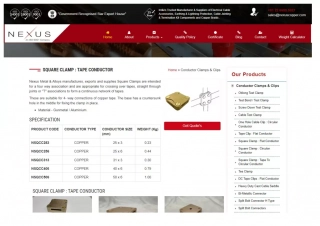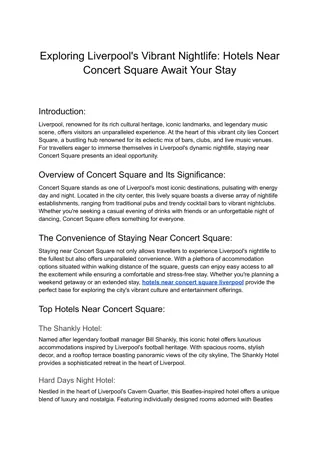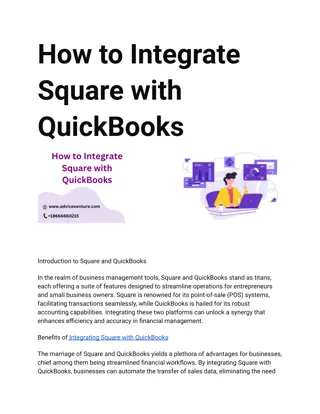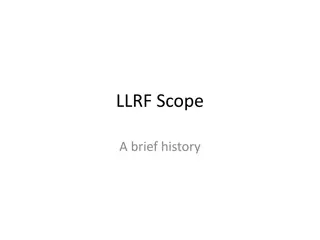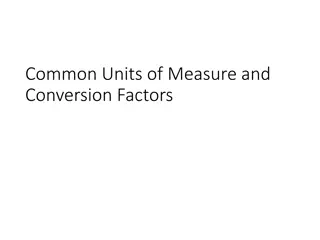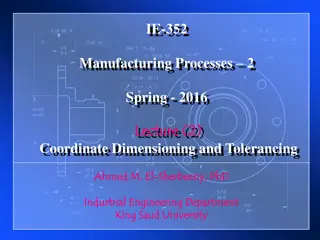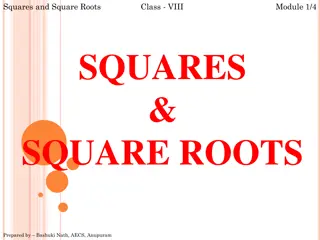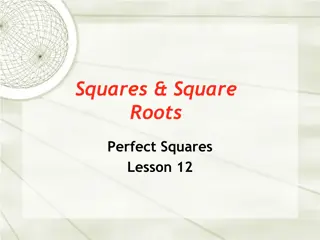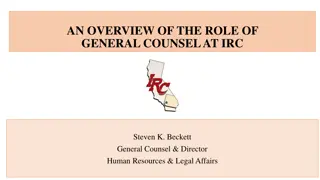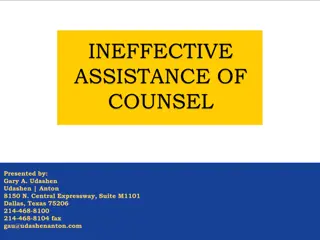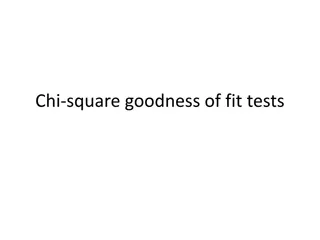Ethics Issues for In-house Counsel: A Square Peg in A Round Hole
The presentation delves into the ethical considerations faced by in-house counsel and the responsibilities they hold as representatives of clients, officers of the legal system, and public citizens. It discusses the various roles of a lawyer, the application of professional responsibilities guided by rules and personal conscience, and the terminology related to legal services organizations. The rules and guidelines outlined offer insight into maintaining the integrity of the legal profession while providing quality justice.
Download Presentation

Please find below an Image/Link to download the presentation.
The content on the website is provided AS IS for your information and personal use only. It may not be sold, licensed, or shared on other websites without obtaining consent from the author. Download presentation by click this link. If you encounter any issues during the download, it is possible that the publisher has removed the file from their server.
E N D
Presentation Transcript
Ethics Issues For In-house Counsel: A Square Peg In A Round Hole ACC South Carolina By Art Justice May 25, 2022
Rule 407 SCACR Title of Presentation Counselor Rules 2.1 to 2.4 Advocate Rules 3.1 to 3.9 Transaction With Persons Other Than Clients Rules 4.1 to 4.5 Law Firms and Associations Rules 5.1 to 5.7 Public Service Rules 6.1 to 6.5 Lawyer Advertising Rules 7.1 to 7.5 Maintaining the Integrity of the Profession Rules 8.1 to 8.5 Preamble Client Lawyer Relationship - Rules 1.0 to 1.19
PREAMBLE: A LAWYER'S RESPONSIBILITIES [1] A lawyer, being a member of the legal profession, is a representative of clients, an officer of the legal system and a public citizen having special responsibility for the quality of justice. [2] As a representative of clients, a lawyer performs various functions. As advisor, a lawyer provides a client with an informed understanding of the client's legal rights and obligations and explains their practical implications. As advocate, a lawyer zealously asserts the client's position under the rules of the adversary system. As negotiator, a lawyer seeks a result advantageous to the client but consistent with requirements of honest dealings with others. As an evaluator, a lawyer acts by examining a client's legal affairs and reporting about them to the client or to others. [7] Many of a lawyer's professional responsibilities are prescribed in the Rules of Professional Conduct, as well as substantive and procedural law. However, a lawyer is also guided by personal conscience and the approbation of professional peers. A lawyer should strive to attain the highest level of skill, to improve the law and the legal profession and to exemplify the legal profession's ideals of public service.
Do These Rules Apply To Me? RULE 1.0: TERMINOLOGY partnership, professional corporation, sole proprietorship or other association, or in a legal services organization; lawyers employed in the legal department of a corporation, government, or other organization; and lawyers associated with an enterprise who represent clients within the scope of that association. (e) "Firm" or "law firm" denotes a lawyer or lawyers in a law
Comments to Rule 1.0 3] With respect to the law department of an organization, , there is ordinarily no question that the members of the department constitute a firm within the meaning of the Rules of Professional Conduct. There can be uncertainty, however, as to the identity of the client. For example, it may not be clear whether the law department of a corporation represents a subsidiary or an affiliated corporation, as well as the corporation by which the members of the department are directly employed.
Rules Apply to More Than Just Practicing Law attorney) or in business capacity, Rules of Professional Conduct apply guide and restrict conduct whether attorney is acting in legal capacity (as
RULE 5.5: UNAUTHORIZED PRACTICE OF LAW; MULTIJURISDICTIONAL PRACTICE OF LAW (b) A lawyer who is not admitted to practice in this jurisdiction shall not: (1) except as authorized by these Rules or other law, establish an office or other systematic and continuous presence in this jurisdiction for the practice of law; or (2) hold out to the public or otherwise represent that the lawyer is admitted to practice law in this jurisdiction.
RULE 5.5: UNAUTHORIZED PRACTICE OF LAW; MULTIJURISDICTIONAL PRACTICE OF LAW debarred, disbarred or suspended from practice in any jurisdiction, may provide legal services, including through an office or other systematic and continuous presence, in this jurisdiction that: (d) A lawyer admitted in another United States jurisdiction, and not (1) are provided to the lawyer's employer or its organizational affiliates and are not services for which the forum requires pro hac vice admission; or (2) are services that the lawyer is authorized to provide by federal law or other law or rule of this jurisdiction.
SECTION 40-5-310. Practicing law or soliciting legal cause of another without being enrolled as member of South Carolina Bar. No person may either practice law or solicit the legal cause of another person or entity in this State unless he is enrolled as a member of the South Carolina Bar pursuant to applicable court rules, or otherwise authorized to perform prescribed legal activities by action of the Supreme Court of South Carolina. The type of conduct that is the subject of any charge filed pursuant to this section must have been defined as the unauthorized practice of law by the Supreme Court of South Carolina prior to any charge being filed. A person who violates this section is guilty of a felony and, upon conviction, must be fined not more than five thousand dollars or imprisoned not more than five years, or both.
What Is The Practice Of Law? preparation of pleadings and other papers incident to actions and special proceedings the management of actions and proceedings on behalf of clients before judges and courts conveyancing and the preparation of legal instruments of all kinds all advice to clients, and all action taken for them in matters connected with the law acting professionally in legal formalities, negotiations, or proceedings by the warrant or authority of their clients. In re Duncan, 83 S.C. 186, 189, 65 S.E. 210 (1909)
RULE 5.5: UNAUTHORIZED PRACTICE OF LAW; MULTIJURISDICTIONAL PRACTICE OF LAW disbarred or suspended from practice in any jurisdiction, may provide legal services, including through an office or other systematic and continuous presence, in this jurisdiction that: (d) A lawyer admitted in another United States jurisdiction, and not debarred, (1) are provided to the lawyer's employer or its organizational affiliates and are not services for which the forum requires pro hac vice admission; or (2) are services that the lawyer is authorized to provide by federal law or other law or rule of this jurisdiction.
Comment to Rule 5.5(d)(1) provide legal services to the client or its organizational affiliates, i.e., entities that control, are controlled by, or are under common control with the employer. This paragraph does not authorize the provision of personal legal services to the employer's officers or employees. The paragraph applies to in-house corporate lawyers, government lawyers and others who are employed to render legal services to the employer. The lawyer's ability to represent the employer outside the jurisdiction in which the lawyer is licensed generally serves the interests of the employer and does not create an unreasonable risk to the client and others because the employer is well situated to assess the lawyer's qualifications and the quality of the lawyer's work. [16] Paragraphs (d)(1) applies to a lawyer who is employed by a client to
Rule 405 Limited Certification of Admission to Practice Law in South Carolina a) Qualifications for Admission. The Supreme Court may issue a limited certificate of admission to practice law in South Carolina to any person who: (1) is at least twenty-one (21) years of age; (2) is a person of good moral character; (3) has received a JD or LLB degree from a law school which was approved by the Council of Legal Education of the American Bar Association at the time the degree was conferred; (4) has been admitted to practice law in the highest court of another state or the District of Columbia; (5) is a member in good standing in each jurisdiction where he is admitted to practice law; (6) has not been disbarred or suspended from the practice of law and is not the subject of any pending disciplinary proceeding in any other jurisdiction; (7) is employed in the legal department or under the supervision of the legal department of a corporation, company, partnership, or association (business employer) which does not provide legal services in South Carolina to the public or its employees. If not a South Carolina corporation, company, partnership or association, the business employer must be qualified or otherwise lawfully engaged in business in South Carolina; (8) performs most of his duties for the business employer in South Carolina and has his principal office in South Carolina; and (9) provides legal services in South Carolina solely for the business employer or the parent or subsidiary of such employer.
Good News Privilege protects clients, and lawyer otherwise admitted in a jurisdiction does not undermine privilege by unauthorized practice No SC case
Rule 1.13 Organization As Client (a) A lawyer employed or retained by an organization represents the organization acting through its duly authorized constituents.
When To Speak Up Rule 1.13(b) person associated with the organization is engaged in action, intends to act or refuses to act in a matter related to the representation that is a violation of a legal obligation to the organization, or a violation of law which reasonably might be imputed to the organization, and that is likely to result in substantial injury to the organization, then the lawyer shall proceed as is reasonably necessary in the best interest of the organization. (b) If a lawyer for an organization knows that an officer, employee or other Unless the lawyer reasonably believes that it is not necessary in the best interest of the organization to do so, the lawyer shall refer the matter to higher authority in the organization, including, if warranted by the circumstances, to the highest authority that can act on behalf of the organization as determined by applicable law.
Comment [3] to Rule 1.13 ordinarily must be accepted by the lawyer even if their utility or prudence is doubtful. Decisions concerning policy and operations, including ones entailing serious risk, are not as such in the lawyer's province. Paragraph (b) makes clear, however, that when the lawyer knows that the organization is likely to be substantially injured by action of an officer or other constituent that violates a legal obligation to the organization or is in violation of law that might be imputed to the organization, the lawyer must proceed as is reasonably necessary in the best interest of the organization. As defined in Rule 1.0(h), knowledge can be inferred from circumstances, and a lawyer cannot ignore the obvious. When constituents of the organization make decisions for it, the decisions See also Comment [4]
Supervisory Responsibilities Rules 5.1 and 5.3 subordinate lawyers Rule 5.1(c) - In-house counsel has responsibility for ethical conduct of Rule 5.3(c) - And non-lawyers
Technology What is your responsibility Rule 1.1 Competence Comment [8] [8] To maintain the requisite knowledge and skill, a lawyer should keep abreast of changes in the law and its practice, including a reasonable understanding of the benefits and risks associated with technology the lawyer uses to provide services to clients or to store or transmit information related to the representation of a client, engage in continuing study and education and comply with all continuing legal education requirements to which the lawyer is subject.
Increased Attacks on Information Security Have Increased Our Ethical Obligations knowledge and obtain sufficient information to protect client information, to get qualified assistance if necessary, or both. These obligations are minimum standards failure to comply with them may constitute unethical or unlawful conduct. Attorneys should aim for security that goes beyond these minimums as a matter of sound professional practice and client service. Compliance requires attorneys to understand limitation in their ABA TechReport, Cybersecurity (Jan. 28, 2019)
Social Media Risks Personal laptops, cellphones, tablets all pose temptation to comment on work matters outside the workplace Is business done or discussed through text, IMs, social media, blogs Relevant social media postings are fair game for discovery
Attorney Recordings or any portion of a conversation of any person whether by tape or other electronic device, without the prior knowledge and consent of all parties to the conversation. Henceforth, this rule shall be applied irrespective of the purpose(s) for which such recordings were made, the intent of the parties to the conversation, whether anything of a confidential nature was discussed, and whether any party gained an unfair advantage from the recordings. We reaffirm our prior rulings that an attorney shall not record a conversation In the Matter of an Anonymous Member 404 S.E.2d 513 (1991)



![[PDF⚡READ❤ONLINE] Black Hole Astrophysics: The Engine Paradigm (Springer Praxis](/thumb/21503/pdf-read-online-black-hole-astrophysics-the-engine-paradigm-springer-praxis.jpg)
